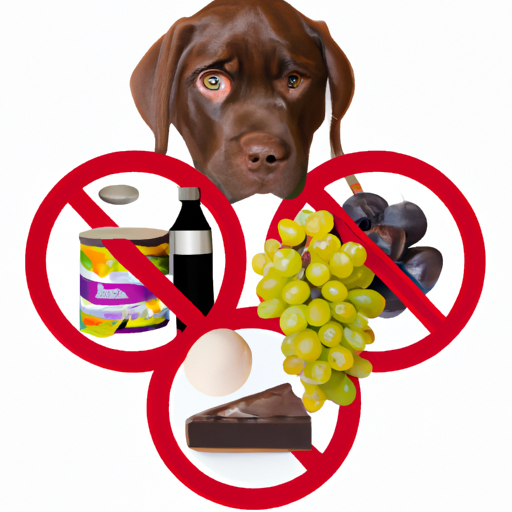As a caregiver, you want the best for your furry friend. But, do you know that some foods can be harmful, or even deadly, to your dog? In this guide, we’ll discuss eight common foods that are bad for dogs.
1. Chocolate
Everyone loves chocolates. But for dogs, it’s a big no-no.
Why is it harmful?
Chocolate contains theobromine and caffeine, which are both toxic to dogs. They can cause vomiting, diarrhea, increased heart rate, and in severe cases, seizures and death.
What to do?
Keep all chocolates, including chocolate-covered snacks, out of your dog’s reach. If your dog ingests chocolate, call your vet immediately.
2. Grapes and Raisins
Grapes and raisins seem harmless, but they’re extremely toxic to dogs.
Why is it harmful?
They can cause sudden kidney failure in dogs. The exact reason why grapes and raisins are toxic to dogs is still unknown.
What to do?
Never leave grapes or raisins within your dog’s reach. If ingested, contact your vet immediately.
3. Onions and Garlic
Onions and garlic are part of the Allium family, and they’re bad news for dogs.
Why is it harmful?
They can destroy a dog’s red blood cells, leading to anemia. This condition can be life-threatening if not treated promptly.
What to do?
Keep your dog away from onions and garlic, both in raw and cooked form. If you suspect your dog has ingested any, consult your vet immediately.
4. Caffeine
Caffeine is as dangerous to dogs as chocolate.
Why is it harmful?
It can cause rapid breathing, heart palpitations, muscle tremors, fits, and bleeding. It can also be fatal in severe cases.
What to do?
Keep coffee, tea, and other caffeinated beverages away from your dog. If your dog has ingested caffeine, seek veterinary help immediately.
5. Alcohol
Alcohol is not suitable for dogs, period.
Why is it harmful?
Even a small amount of alcohol can cause significant damage. It can lead to vomiting, diarrhea, decreased coordination, central nervous system depression, difficulty breathing, tremors, coma, and even death.
What to do?
Never allow your dog to ingest alcohol. If they do, contact your vet immediately.
6. Nuts
Certain types of nuts, like macadamia nuts, can be harmful to dogs.
Why is it harmful?
They can cause weakness, depression, vomiting, tremors, and hyperthermia in dogs.
What to do?
Avoid feeding your dog any type of nuts. If they’ve ingested nuts, call your vet immediately.
7. Avocado
Avocados contain a toxin called persin, which is harmful to dogs.
Why is it harmful?
It can cause vomiting, diarrhea, and heart congestion.
What to do?
Keep avocados away from your dog. If they’ve ingested an avocado, contact your vet.
8. Dairy
Dairy products can cause digestive problems in dogs.
Why is it harmful?
Dogs lack the enzyme to break down lactose in dairy, leading to upset stomach, diarrhea, and food allergies.
What to do?
Avoid feeding your dog dairy products. If they’ve ingested dairy and show signs of distress, consult your vet.
FAQs
Q1: Can dogs eat peanut butter?
Dogs can eat peanut butter, but it should be free of xylitol, a sweetener that is toxic to dogs.
Q2: Can dogs eat cheese?
Some dogs can tolerate cheese in small amounts, but others may experience gastrointestinal issues. It’s best to consult with your vet.
Q3: Can dogs eat eggs?
Yes, dogs can eat eggs. They’re a great source of protein. However, make sure they’re cooked, as raw eggs can carry bacteria like Salmonella.
Q4: Can dogs eat apples?
Yes, dogs can eat apples. But remove the seeds and core as they can pose a choking hazard.
Q5: Can dogs eat bananas?
Yes, dogs can eat bananas in moderation. They’re high in sugar, so they should not be a regular part of your dog’s diet.
Remember, when in doubt, always consult with a vet. Your dog’s health and well-being are worth it.



